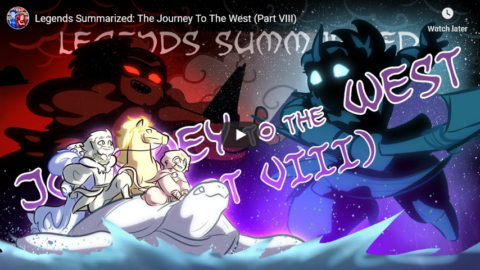Overly Sarcastic Productions
Published 25 Dec 2020Journey to the West Kai, episode 5: Fishy Business and Mountaineering Madness!
Danger! Intrigue! Sandy fights a carp! Pigsy gets two makeovers! Monkey reunites with several old frenemies, and Tripitaka gets less screentime than the horse!
(merry christmas)
(Here’s a cheeky little bit of merch: https://www.redbubble.com/shop/ap/656…)
FIRST EPISODE: https://www.youtube.com/watch?v=61nuX…
PREVIOUS EPISODE: https://youtu.be/ABuG8hZqynI
FULL SERIES: https://www.youtube.com/playlist?list…Our content is intended for teenage audiences and up.
PATREON: https://www.Patreon.com/OSP
MERCH LINKS: https://www.redbubble.com/people/OSPY…
DISCORD: https://discord.gg/h3AqJPe
OUR WEBSITE: https://www.OverlySarcasticProductions.com
Find us on Twitter https://www.Twitter.com/OSPYouTube
Find us on Reddit https://www.Reddit.com/r/OSP/
December 26, 2020
Legends Summarized: The Journey To The West (Part VIII)
Repost – The market failure of Christmas
Not to encourage miserliness and general miserability at Christmastime, but here’s a realistic take on the deadweight loss of Christmas gift-giving:
In strict economic terms, the most efficient gift is cold, hard cash, but exchanging equivalent sums of money lacks festive spirit and so people take their chance on the high street. This is where the market fails. Buyers have sub-optimal information about your wants and less incentive than you to maximise utility. They cannot always be sure that you do not already have the gift they have in mind, nor do they know if someone else is planning to give you the same thing. And since the joy is in the giving, they might be more interested in eliciting a fleeting sense of amusement when the present is opened than in providing lasting satisfaction. This is where Billy Bass comes in.
But note the reason for this inefficient spending. Resources are misallocated because one person has to decide what someone else wants without having the knowledge or incentive to spend as carefully as they would if buying for themselves. The market failure of Christmas is therefore an example of what happens when other people spend money on our behalf. The best person to buy things for you is you. Your friends and family might make a decent stab at it. Distant bureaucrats who have never met us — and who are spending other people’s money — perhaps can’t.
So when you open your presents next week and find yourself with another garish tie or an awful bottle of perfume, consider this: If your loved ones don’t know you well enough to make spending choices for you, what chance does the government have?
The Matchbox Car Story
Little Car
Published 27 Jan 2020Matchbox is a popular British toy brand which was introduced by Lesney Products in 1953, and is now owned by Mattel, Inc. The brand was given its name because the original die-cast Matchbox toys were sold in boxes similar to those in which matches were sold. The brand grew to encompass a broad range of toys, including larger scale die-cast models, plastic model kits, and action figures.
During the 1980s, Matchbox began to switch to the more conventional plastic and cardboard “blister packs” that were used by other die-cast toy brands such as Hot Wheels. The box style packaging was re-introduced for the collectors’ market in recent years, particularly with the release of the “35th Anniversary of Superfast” series in 2004.
The script for this video comes from Wikipedia:
https://en.wikipedia.org/wiki/Matchbo…
If you find issues with the content, I encourage you to update the Wikipedia article, so everyone can benefit from your knowledge.
If you like these video and want to support me from just $1 or 80p a month at https://www.patreon.com/bigcar
#matchboxcars
QotD: British meals – fish, fowl, and vegetables
There are not many methods of cooking birds which are peculiar to Britain. The British regard as inedible many birds – for instance, thrushes, larks, sparrows, curlews, green plovers and various kinds of duck – which are valued in other countries. They are also inclined to despise rabbits, and rabbit-rearing for the table has never been extensively practiced in Britain. On the other hand they will eat young rooks, which are shot in May and baked in pies. They are especially attached to geese and turkeys, which (at normal times) are eaten in immense quantities at Christmas, always roasted whole, with chestnut stuffing in the case of turkeys, and sage and onion stuffing and apple sauce in the case of geese.
Fish in Britain is seldom well cooked. The sea all round Britain yields a variety of excellent fishes, but as a rule they are unimaginatively boiled or fried, and the art of seasoning them in the cooking is not understood. The fish fried in oil to which the British working classes are especially addicted is definitely nasty, and has been an enemy of home cookery, since it can be bought everywhere in the big towns, ready cooked and at low prices. Except for trout, salmon and eels, British people will not eat fresh-water fish. As for vegetables, it must be admitted that, potatoes apart, they seldom get the treatment they deserve. Thanks to the rain-soaked soil, British vegetables are nearly all of excellent flavour, but they are commonly spoiled in the cooking. Cabbage is simply boiled – a method which renders it almost uneatable – while cauliflowers, leeks and marrows are usually smothered in a tasteless white sauce which is probably the “one sauce” scornfully referred to by Voltaire. The British are not great eaters of salads, though they have grown somewhat fonder of raw vegetables during the war years, thanks to the educational campaigns of the Ministry of Food. Except for salads, vegetables are always eaten with the meat, not separately.
George Orwell, “British Cookery”, 1946. (Originally commissioned by the British Council, but refused by them and later published in abbreviated form.)






